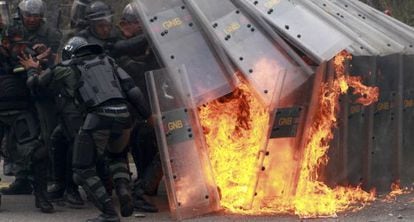Venezuelan government blames subversives for escalating violence
US Secretary of State John Kerry expresses “deep concern” at state of affairs

Just when the waters seemed to be calming in Venezuela following months of turmoil, Interior, Justice and Peace Minister Miguel Rodríguez Torres has denounced that the street protests have become subversive in nature.
The minister made the statement at a press conference Friday, expounded on it during an interview released on Sunday, and has insisted on the issue throughout the week.
The blocked streets – known locally as “guarimbas” – have made way to something much more dangerous, including real or attempted assassinations of Hugo Chávez followers and other acts of violence by subversive groups, according to the government.
Analysts believe that this rhetoric seeks to deligimitize the popular protests against the government and widen the gap between the opposition moderates who are willing to negotiate with the authorities – a group led by former presidential contender Henrique Capriles Radonski and the secretary of the opposition alliance Ramón Guillermo Aveledo – and other government detractors who are not part of the Peace Conference, including the deposed deputy María Corina Machado, opposition leader Leopoldo López and Caracas mayor Antonio Ledezma.
Eight out of 10 people surveyed in Venezuela feel that the country’s situation is negative
The administration of Nicolás Maduro, who succeeded the deceased Chávez in hotly disputed elections in April of last year, listed a few events from last week meant to support the official theory of a domestic threat from subversives.
One of these events was the assassination of Eliézer Otaiza, former intelligence chief at Disip (the political police under Hugo Chávez); another was the killing of one of Maduro’s bodyguards, as well as the attack against a television host on the official national channel, and the burning of antiriot vehicles and street furniture. Public officials also mentioned the rioting at Fermín Toro University in Barquisimeto, which caused extensive damage to its infrastructure. There was also an attack against a gas station in San Cristóbal.
The opposition has dismissed these claims as unfounded, leading Minister Rodríguez Torres to produce yet more evidence. In an interview aired on Venevisión, which is owned by the business mogul Gustavo Cisneros, the minister showed a picture of María Corina Machado standing next to an alleged criminal named Yamil Breik, who is said to be behind the violent protests in Valencia, the third-largest city in the country.
Analysts believe that this rhetoric is aimed at deligimitizing the popular protests
This new take on the conflict comes amid serious questions about Maduro’s popularity and the poor results of the talks between the government and the opposition. On Monday, the daily El Universal published the results of a national survey conducted between March 31 and April 20, showing that eight out of 10 Venezuelans feel the country’s situation is negative. A majority (59.2 percent) does not approve of Maduro, whose popularity ratings have plummeted nearly 15 points since November.
On Wednesday the United States commented on the apparent lack of progress at the bilateral meetings. State Secretary John Kerry said he was “deeply concerned about the deteriorating situation in Venezuela,” and asked for greater progress at talks that are backed by the regional organization Unasur and by the Vatican.
The Venezuelan government automatically responded with criticism, saying these statements “encourage the more reactionary sectors of the opposition to prolong violent actions that are unsanctioned by the Constitution.”










































